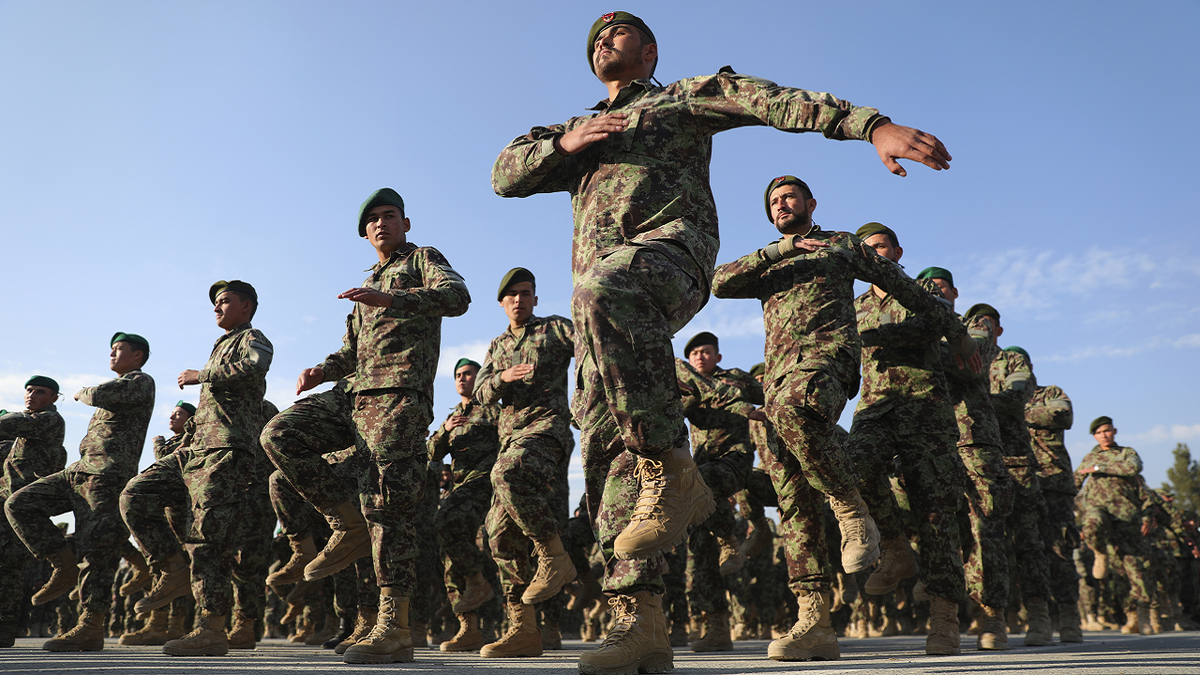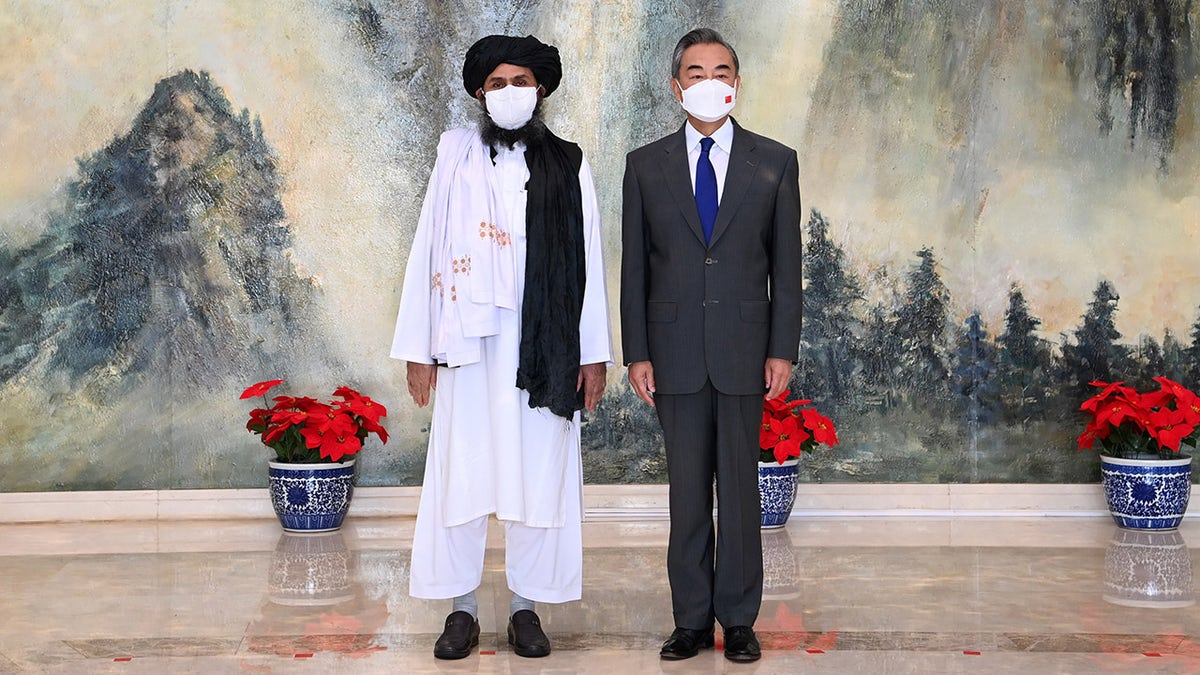Afghanistan made Putin view Biden as 'weak': Fmr. Attorney Gen. Bill Barr
Former Attorney General Bill Barr joins 'America's Newsroom' to discuss his new book and to share his thoughts on Putin's perceptions of Biden.
The United Nations Security Council agreed to renew its assistance mission for Afghanistan for another year on Thursday – not long after UN Secretary-General Antonio Guterres described the situation in the war-torn nation in January as "hanging by a thread."
His words, observers say, served as a stark reminder of the state of affairs that saw the sudden downfall of its government following the Biden administration’s rapid withdrawal of U.S. military forces last August.
"The Russian play in Ukraine is directly related to the weakness and incompetence we displayed to the world with our tragically flawed withdrawal from Afghanistan," said Christopher Miller. Miller served as acting secretary of defense in the Trump administration and was a veteran of the Afghan campaign. "The Chinese, North Koreans and Iranians took note. We are in the most dangerous geo-strategic situation since the Cuban missile crisis."
Miller was one of the first officers to lead troops into Afghanistan where he commanded the Fifth Special Forces group after 9/11. Miller, who retired as a colonel in the special forces, also trained and fought alongside Afghan troops during his service there.
He pulled no punches over the U.S. withdrawal: "It's an absolute disgrace, and I'm ashamed personally and professionally at how we left our Afghan allies in such a desperate situation. It was completely preventable."
Prior to becoming acting defense secretary, he was part of a team working on the Trump administration’s withdrawal plan. He said the narrative used by the Biden administration that characterized the situation as "unpredictable" was negligent.

Newly graduated Afghan National Army personnel march during their graduation ceremony after a three-month training program at the Afghan Military Academy in Kabul, Afghanistan, in November 2020. (AP/Rahmat Gul, File)
"Our adversaries noted our fecklessness, and we couldn't have provided them more powerful ammunition to create dissension with our allies and partners. … We're going to be dealing with the blowback on our ham-handed, disastrous withdrawal for the next 20 years -- I'd hate to be a military man or diplomat trying to convince a potential partner to work with us."
During the early days of the withdrawal, reports of resistance by anti-Taliban forces, including elements of the Northern Alliance with a new group called the National Resistance Front (NRF), came together. However, without U.S. funding, their efforts will be in vain, according to Miller and other experts.
Miller bemoaned the lack of planning leading up to the Taliban takeover and said the US should support "anyone or group in Afghanistan that wishes to establish a meaningful government that can create opportunity and justice for the Afghan people."
HAWLEY TO INTRODUCE BILL TO INCREASE AFGHAN VETTING AFTER CRITICAL PENTAGON IG REPORT
Miller maintained the lack of planning meant that Taliban forces defeated the Northern Alliance and other forces during their hour of need.
"If we had armed them and provided a handful of advisers to direct airstrikes, the Northern Alliance would still be in control of an enclave in the north that we could have developed additional resistance forces to use to pressure the Taliban to moderate their behavior (perhaps even establish a coalition government) or to mass forces to move on Kabul."
Bill Roggio, a senior fellow at the Freedom for the Defense of Democracies (FDD), said the National Resistance Front (NRF), based in Tajikistan and led by former Afghan Vice President Amrullah Saleh, so far has had minimal impact and said the Biden administration needs to both arm and fund them, "but the administration does not want to reengage in Afghanistan. It is inclined to work with the Taliban instead."
Roggio is the editor of the acclaimed Long War Journal, a publication that has provided in-depth analysis of the global war on terror since 2007. He described Afghanistan as a "black hole for terrorists," noting the terror threat coming out of Afghanistan is "significant."
He said al Qaeda and its leadership once again have found themselves a safe haven to operate from if they so choose. "The Taliban-al Qaeda alliance is strong, it was never broken," he added, while noting, "Other international and regional terror groups such as The Movement of the Taliban in Pakistan, the Turkistan Islamic Party, the Islamic Jihad Union, the Islamic Movement of Uzbekistan and Ansraulah are currently operating" under the Taliban's protection.
With no U.S. presence in Afghanistan and bordering countries, he painted a bleak picture for those who were left behind by the U.S. and our ability to fight the terrorists there.
MCCONNELL ON 'AMERICA'S NEWSROOM': BIDEN'S 'CUT AND RUN' FROM AFGHANISTAN SENT A MESSAGE TO PUTIN
"The Biden administration has done little to help because it has next to no capacity to help. Additionally, President Biden does not seem inclined to help. His attitude towards Afghans who have supported American efforts has been callous since the moment he announced the withdrawal." Roggio concluded that the "ability to conduct counterterrorism strikes against al Qaeda, the Islamic State and other terror groups has been reduced to nearly zero."
With the U.S. presence now non-existent in Afghanistan, the question observers want to know is who will fill the vacuum? While Miller noted that Russia, Pakistan, and Iran are looking across their common borders, China has taken a particular interest. "Beijing certainly wants to take advantage of a U.S.-free Afghanistan, but it is not entirely clear that it will be able to do so," noted Gordon Chang, a leading expert on China.
Chang, a distinguished fellow at the Gatestone Institute, described Beijing’s thinking: "China wants to use Afghanistan as the first part of a land bridge to the Arabian Sea so that it will not be dependent on the Strait of Malacca, a choke point. Moreover, the Chinese covet Afghanistan’s minerals, like copper and lithium, and they want to make sure Afghan territory will not end up as a refuge for militants attacking China."

Chinese State Councilor and Foreign Minister Wang Yi meets with Mullah Abdul Ghani Baradar, political chief of Afghanistan's Taliban, in north China's Tianjin, July 28, 2021. (Li Ran/Xinhua via Getty Images, File)
Chang says it won’t necessarily be easy, noting, "None of these objectives will be obtainable unless the Afghan Taliban — or some other group — establishes control and stabilizes the situation. If some group does accomplish that, China will probably get most everything it wants."
And with a human rights situation in tatters, those who are suffering the most are women and girls and religious and other minority groups.
Paul, who didn’t want to use his real name out of fear, is an Afghan Christian. He told Fox News Digital that he was able to escape to the U.S. and says Christians like him have been ruthlessly targeted by the Taliban: "If a Talib knows you are an Afghan Christian, that’s a great blessing for him to kill you."
RUSSIA IN FOR NASTY GUERRILLA WARFARE CAMPAIGN THAT WILL BLEED THEM DRY, FORMER GREEN BERET SAYS
Afghanistan recently topped North Korea as the worst country in the world for Christian persecution. The yearly World Watch List is published by Open Doors USA.
Paul described the dire economic situation that he left behind him: "People don’t have jobs, and yeah, many sell their kidneys, people (are) starving,"
CLICK HERE TO GET THE FOX NEWS APP
Speaking at a recent U.N. Security Council meeting, Afghan American Women’s rights activist Ahbouba Seraj said, "It has taken less than six months to completely dismantle the rights of women and girls across the country."
Yet even with all the despair and instability in Afghanistan, Miller still held out hope for the war-torn nation. "The Afghan people are enormously industrious and rugged, and Afghanistan has a large amount of natural resources that could be developed -- they just need meaningful leadership," he said.











































